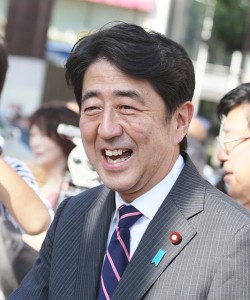It may appear that Japanese voters have opted for a “back-to-the-future” election, reinstalling Shinzo Abe and his once-dominant Liberal Democratic Party to power. But the move reflects a desire to move forward out of Japan’s economic rut, says ex-CIA analyst Paul R. Pillar.
By Paul R. Pillar
A landslide victory for the Liberal Democratic Party in elections Sunday for the lower house of the Japanese legislature has given party leader Shinzo Abe something no other Japanese politician has achieved in the last half century: a second chance as prime minister.
Abe had the job for a year in 2006-2007, part of a pattern of Japanese prime ministers in recent times (with rare exceptions such as the charismatic Junichiro Koizumi) serving brief stints before usually rotating out amid growing unpopularity. It appears that the LDP along with its coalition partner, the New Komeito Party, will have a two-thirds super-majority, enough to transact business even without controlling the upper house of the Diet.
Exit polls show that economic issues and the need to push Japan out of its deflationary slump were most important to voters. But Abe, usually described as “hawkish,” probably benefited some from a public desire to stand up for Japanese interests in the East Asian and Pacific region. The escalating tension with China over the Senkaku/Daioyu islands, as well as a separate territorial dispute with South Korea, may have helped him.
Beyond such observations, the direction in which Abe will lead Japan’s foreign and security is still in large part undetermined. There is speculation about how Abe will shape his second premiership in light of lessons or failures from the first but no precedent, since the early days after World War II, of a returning Japanese prime minister on which to base any such predictions.
Abe himself, in a diffident post-election interview from which chest-thumping American politicians could learn some lessons, acknowledged that the election outcome was less an endorsement of any LDP program than a rejection of the incumbent Democratic Party of Japan:
“I think the results do not mean we have regained the public’s trust 100 percent. Rather, they reflect ‘no votes’ to the DPJ’s politics that stalled everything the past three years. Now we are facing the test of how we can live up to the public’s expectations, and we have to answer that question.”
Abe’s room for maneuver in shaping Japan’s foreign policy may be more limited than the decisive election result suggests. The LDP is on record as favoring some policies that would be consistent with Abe’s hawkish reputation, but the government will be restrained by the still considerable pacifist tendencies in New Komeito and Japanese public opinion.
The United States is unlikely to have much ability to move Tokyo’s overall security policy one way or another. But it would at least be useful to have an idea of what the United States should favor, in the event of any opportunities to nudge the new government in the desired direction.
What that desired direction ought to be is not self-evident. The United States does not have any positive interest in tensions and suspicions escalating between Japan and its East Asian neighbors, over the Senkaku/Daioyu dispute or anything else. That would complicate whatever else one might hope to accomplish in the way of regional security, and it would only encourage the kinds of reactions from China that would be unhelpful.
Some such complications are likely to occur in any case. One might be a visit by Abe to the Yasukuni shrine, which memorializes Japanese war dead, including World War II commanders considered war criminals. Abe says he regrets he did not visit the site during his first stint as prime minister (although notably Koizumi, amid complaining from the regional neighbors, did visit it).
But then there is, from the U.S. point of view, an issue of burden-sharing. Japan has limited its military spending to one percent of GNP. The comparable figure for the United States is 4.7 percent. For an LDP government to go beyond the one percent figure could be good for the United States if it meant less of a perceived need in the United States to carry security burdens in the East Asia-Pacific region that Japan ought to be at least as able to carry.
Perhaps the best direction from the standpoint of U.S. interests would be a big (or at least bigger than at present)-stick, soft-voice posture for Japan, in which there would be some shifting of burdens but minimal exacerbation of regional sensitivities about Japanese assertiveness.
Paul R. Pillar, in his 28 years at the Central Intelligence Agency, rose to be one of the agency’s top analysts. He is now a visiting professor at Georgetown University for security studies. (This article first appeared as a blog post at The National Interest’s Web site. Reprinted with author’s permission.)


Show Comments